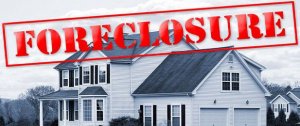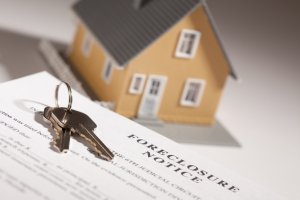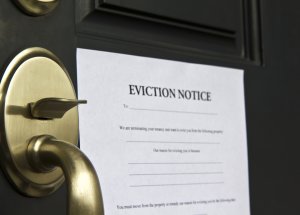How To Sell A House That Is In Foreclosure
If you are a homeowner who has defaulted on a home loan, your options probably seem very limited. If you don’t come up with the money you owe the bank in a very short amount of time—money you probably don’t have, otherwise you wouldn’t have defaulted to start with—the bank will foreclose, and you will lose your house. The situation is overwhelming, to say the least.

Though foreclosure is a long, stressful, and confusing process, the situation is not hopeless. If you think your only option after defaulting on your mortgage is to wait for eviction, it isn’t. You can control what happens to your home and your family, and We Can Help!
Selling a home in foreclosure is a viable option for most homeowners. Dependable Homebuyers can help you avoid foreclosure by selling your home on fair terms that you choose. We buy houses in any situation and any condition. Better still, with Dependable Homebuyers, the sale process is fast, easy, and stress-free. In many cases, we can put cash in your hand in about a week!
Below we explain the foreclosure process in detail to take away some of the mystery and to help allay your fear that the situation is beyond your control. We also discuss some of the benefits of selling a home in foreclosure that you may not have considered. Then, we’ll show you how Dependable Homebuyers is the answer you’re looking for. We deal with homes that have a mortgage, a reverse mortgage, or a mechanic’s lien. When it comes to selling your house quickly and avoiding the humiliation and financial disaster that foreclosure can bring, we are here to help.
As we hope you’ll see, if you are facing foreclosure, Dependable Homebuyers can be the solution to your problem. Because we work FAST, we are perfectly positioned to buy your home and save you from foreclosure if you are up against a deadline to sell or face eviction. You can save your credit, resolve your outstanding debt (with the approval of your lender), know your timetable for moving out of your home, and do all of this with dignity, on terms you choose. All you have to do is contact us today!
Get An Offer Today
What Is Foreclosure?
To answer this question, we must first understand some basic terminology. “Mortgage” is a fancy word for a loan that is used to purchase a home. If a lender “holds” a mortgage, that means that that lender is entitled to repayment of that loan.
If a person has a mortgage on a home, it is technically a misnomer to call that person a “homeowner.” That individual is, in reality, a “home borrower” who lives in the home so long as regular loan installments are paid to the holder of the mortgage (usually a bank) from which the mortgage was obtained.
There are three more terms that are useful to know. While these terms have meanings that can differ depending on the context, here we’re talking about the context of homebuying and foreclosure.
The first term is “security.” A security is simply collateral for a loan. In this case, your house is the security.
The second term is “security interest.” A security interest is a legal right the lender has over your home. Here, the mortgage itself gives the lender specific legal rights with respect to your home.
The third term you need to know is “lien.” A lien is a legal right that the bank has to repossess your house if you don’t pay your mortgage. The right exists to protect the bank by ensuring that the bank will recoup the money owed for the property even if the homeowner doesn’t pay the mortgage.
We’re available to talk about your property at any time! Give us a call today at: (855) 741-4848
Because the home serves as collateral for the mortgage, the mortgage is called a “secured loan.” The amount of the lien is the outstanding amount of the mortgage. So long as the borrower pays to the lender regular installments on the mortgage, which consist of a small amount of the principal plus outstanding interest, the borrower is allowed to live in the home.
Most people who we think of as “homeowners” are actually in the situation just described. They are borrowers who pay monthly installments to a lender who holds a security interest in the form of the mortgage on the home.
Now that we know what we’re talking about,
What is foreclosure?
“Foreclosure” is the name for the formal legal process by which the lender attempts to recover the amount of money owed on the mortgage in the event the homeowner stops making payments. The lender’s goal in foreclosure is to use a legal process to force the homeowner to forfeit all legal rights to the property, which the lender will usually sell in order to recoup the money owed on the mortgage.
The foreclosure process starts when the lender provides formal notice of default to the homeowner. How this notice must be provided  varies by state. There is then a pre-foreclosure grace period during which the homeowner can save the home from foreclosure by paying off any outstanding debt on the mortgage. Note, this does not mean that the homeowner has to pay off the entire mortgage; usually, it means that the homeowner must pay only the amount they are in default—the amount they owe to make the mortgage “current”—plus a penalty for late payment.
varies by state. There is then a pre-foreclosure grace period during which the homeowner can save the home from foreclosure by paying off any outstanding debt on the mortgage. Note, this does not mean that the homeowner has to pay off the entire mortgage; usually, it means that the homeowner must pay only the amount they are in default—the amount they owe to make the mortgage “current”—plus a penalty for late payment.
The homeowner also has the option of selling the home and satisfying the outstanding mortgage through an agreement with the lender. More on this below:
If the homeowner can’t pay off the outstanding debt, the homeowner will be formally evicted. The property then goes to a foreclosure auction where the lender will try to sell the home for at least the amount of money the lender is owed on the mortgage. If the property doesn’t sell at auction, the lender then takes possession of it.
Even after the sale, in many states, the borrower has a “right of redemption.” This is essentially a take-back period after the auction in which the original homeowner has a right to repurchase the home. The amount of time this right applies varies, but in some states, it can be as long as two years. Once the legal redemption period has passed, whoever possesses the home now has clear title to it, and can do with the home whatever they want.
Though the preceding information is generally true in most states, all contracts are different, and the laws of each state differ on many of the details. If you find yourself facing foreclosure, it is in your best interest to consult an attorney to find out what your specific rights and obligations are with respect to your mortgage.
Can I Sell My Home While It’s in Foreclosure?
In most cases, yes, you can! And we can help.
As we noted above, during foreclosure the homeowner has the option of selling the home and satisfying the outstanding mortgage in full, along with any penalties and fees associated with the foreclosure, through an agreement with the lender. This can happen up until the home is sold at auction or the lenders takes possession.
Working to your advantage, however, is that many lenders hate foreclosures. Foreclosures are expensive and time-consuming, involving lawyers and expenses at multiple stages of the process, and can also create bad publicity for banks. For these reasons, some lenders will agree to a “short sale,” where you sell your home for less than everything you owe, and the bank agrees to accept less than what is owed on the loan.
Why would the lender do this? Two simple reasons. One, they can usually write off the loss (meaning they get a tax benefit). Two, they avoid the foreclosure process altogether; even if they believe they will succeed in foreclosing, they’ll have spent money on lawyers and related fees and still end up with a house to unload in the end. A short sale still gets the lender most of its money back without any of the added hassle that the foreclosure process entails.
We’re available to talk about your property at any time! Give us a call at (855) 741-4848 today. We’re local and would love to meet you at your property in person to talk about your options.
There are other added benefits to a short sale. In a normal real estate transaction, the seller typically pays real estate agent commissions and other closing costs; in a short sale, the seller pays nothing, and the lender foots the bill. Also, if your lender has agreed to give you extra time to find a buyer, this is time you are still living in your house.
NOTE: that in order to resolve your outstanding mortgage with a short sale, you must have approval from the lender. Also, make sure that you get the lender to agree not to pursue something called a “deficiency judgment” against you. In some jurisdictions, the lender can take legal action against you for the amount of money that remains on the mortgage after the lender receives the proceeds of the short sale. That amount of money is called the “deficiency.” The judgment that the lender would obtain in this situation is called a “deficiency judgment,” because the lender gets a judgment against you for the amount of the deficiency. If your lender agrees to a short sale, make sure the lender also agrees not to pursue a deficiency judgment, or you’ll have a new set of problems despite the fact that you avoided foreclosure.
Why Should I Sell My Home While It’s in Foreclosure?
You might be thinking “If I sell my home while it’s in foreclosure, I still end up having to move out and losing my home. Why not just let the foreclosure run its course?” Here are four reasons why not:
- FIRST, foreclosure will have disastrous consequences for your credit. Having a house foreclosed upon is comparable to bankruptcy in the amount of long-term damage done to your credit. While it isn’t ideal to have to move out of the house you currently have, it will be next to impossible for you to get financing for a new house—and maybe even to pass a credit check by a landlord if you’re trying to rent an apartment instead—if the foreclosure goes through.
- SECOND, if the foreclosure continues, eventually you will face eviction. Law enforcement officers will show up at your home, remove

Avoid Eviction. Contact us today! (855) 741-4848 all your possessions, and make you leave. Eviction is a traumatic process for any family to go through, and one you can avoid by taking matters into your own hands.
- THIRD, you can stay in your home a little longer. If you inform your lender that you plan to sell your home and pay off your outstanding debt, many lenders will give you additional time to find a buyer and complete the sale in order to avoid having to deal with the foreclosure process.
- FOURTH, by selling your house before the foreclosure is complete, you resolve the situation on your terms. You have the dignity of selling your own home—not having it taken by the bank. You can settle your debts without causing long-term damage to your credit, and you can do it on a timetable you are comfortable with—not on the bank’s timetable.
How Can Dependable Homebuyers Help Me Sell My Home While It’s in Foreclosure?
 If you are facing foreclosure, Dependable Homebuyers can resolve your situation quickly and painlessly. We work FAST—we can make a same-day cash offer on the property and can close on the house, putting cash in your hand, in as little as seven days.
If you are facing foreclosure, Dependable Homebuyers can resolve your situation quickly and painlessly. We work FAST—we can make a same-day cash offer on the property and can close on the house, putting cash in your hand, in as little as seven days.
How do we do this?
First, you send us some basic information about your home through the link below. If your home meets our buying criteria (and most homes do), we’ll be in touch within 24 hours to set up a quick appointment with you at your home.
Assuming everything still checks out after we see your home (and it should if you provide us with accurate information), we will present you with a written offer at a reasonable price. We will buy your house as-is; no repairs needed.
If you like the offer and accept it, then Dependable Homebuyers will draw up the necessary paperwork. We will then close on the sale of your house at a reputable local title company, often in as little as seven days.
If you don’t like our offer, you are under no obligation to accept it; you can simply walk away. But if you walk away, you’ll miss out on the opportunity to get cash in your hands.
Other benefits of selling with Dependable Homebuyers? We won’t charge you any fees or ask you to spend any money. That means no inspection fee, no real estate agent commissions, no appraisal fees, and no out-of-pocket repairs. The whole process costs you nothing!
THE BOTTOM LINE: Dependable Homebuyers can be the solution to your foreclosure problem. If you contact us today, you can have a no-obligation cash offer in less than 24 hours. You will pay no fees, and you will have cash in your hand in as little as seven days. You can resolve your debt, get yourself out of foreclosure, salvage your credit with your dignity intact, and avoid unnecessary hassle along the way.
What are you waiting for?
You could already be on your way to getting CASH in your hands and escaping a messy foreclosure. Contact us NOW!
We buy houses in ANY CONDITION. There are no commissions or fees and no obligation whatsoever. Start below by giving us a bit of information about your property...What Do You Have To Lose? Get Started Now...
